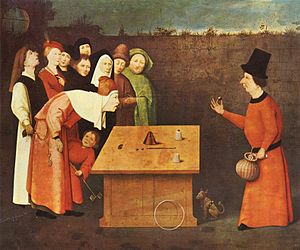User:Lucia Dossin: Difference between revisions
Lucia Dossin (talk | contribs) No edit summary |
Lucia Dossin (talk | contribs) No edit summary |
||
| Line 81: | Line 81: | ||
The first reportedly known magician, Dedi, lived in ancient Egypt (2700BC) and was supposedly able to resurrect animals after having their heads cut. | The first reportedly known magician, Dedi, lived in ancient Egypt (2700BC) and was supposedly able to resurrect animals after having their heads cut. | ||
Since the beginning, magic has been associated with supernatural powers. In the Middle Ages, it has been associated with witchcraft. According to the | Since the beginning, magic has been associated with supernatural powers. In the Middle Ages, it has been associated with witchcraft. According to the [http://www.geniimagazine.com/magicpedia/ Magicpedia], in the Renaissance a few important books were published on the subject. | ||
Natural Magic (Magia natvralis libri viginti, written by John Baptista Porta in 1558) was a book on Natural Sciences and contained information on 'geology, optics, medicines, poisons, cooking, magnets and its properties, fires, gunpowders, invisible and clandestine writing'. (Wikipedia) | Natural Magic (Magia natvralis libri viginti, written by John Baptista Porta in 1558) was a book on Natural Sciences and contained information on 'geology, optics, medicines, poisons, cooking, magnets and its properties, fires, gunpowders, invisible and clandestine writing'. (Wikipedia) | ||
| Line 88: | Line 88: | ||
One of the most ancient performances is the 'Cup and Balls'. It has been performed for the last 2000 years. It is still considered such a relevant trick that many consider that mastering it is essential for someone to be called a magician. | One of the most ancient performances is the 'Cup and Balls'. It has been performed for the last 2000 years. It is still considered such a relevant trick that many consider that mastering it is essential for someone to be called a magician. | ||
[http://www.youtube.com/watch?v=nrw3euF2cIg | [http://www.youtube.com/watch?v=nrw3euF2cIg Penn and Teller cups and balls] | ||
Revision as of 21:30, 23 September 2014
Reading Writing Research Methodologies
Notes on Reading
- Discipline, Control and the current state of Internet - notes
- Discipline, Control and the current state of Internet - common notes (group)
- Protocol – Introduction Chapter (Alexander Galloway)
- Empire - Chapter 1.2 Biopolitical Production (Antonio Negri and Michael Hardt)
Writing
- Work description in 300 words
- On Discipline Society / Society of Control
- Observations on Being an User
- Zizek / Martens / Oppenheimer
- Interview
- Essay on Method
Prototyping Networked Media
Assignments
- Assignment #1 Python & Turtle
- Assignment #3 Python Generated Sound Files - RAW DATA
- Assignment #3 Python Generated Image Seque3nce - RAW DATA
- Assignment #4 Working with text ...................
- Assignment #5 Roll Your Own Google
Modules
Prototyping Lens Based
Assignments
- Editing Scheme ...................
- Kinect
Thematic Seminars
Politics of Craft
Sound Narrative
Archive
Self-directed Research
Cookbook
Links
EMO entry
The Magician
The magician is a professional hired to entertain by performing tricks. One of the specific feature of this profession is the commitment to secrecy. An illusionist that reveals tricks can be expelled from the group.
History
The first reportedly known magician, Dedi, lived in ancient Egypt (2700BC) and was supposedly able to resurrect animals after having their heads cut.
Since the beginning, magic has been associated with supernatural powers. In the Middle Ages, it has been associated with witchcraft. According to the Magicpedia, in the Renaissance a few important books were published on the subject.
Natural Magic (Magia natvralis libri viginti, written by John Baptista Porta in 1558) was a book on Natural Sciences and contained information on 'geology, optics, medicines, poisons, cooking, magnets and its properties, fires, gunpowders, invisible and clandestine writing'. (Wikipedia)
'The Discoverie of Witchcraft' (written in 1584 by Reginald Scot) not only disclosed trick secrets but also presented a strong position against the Catholic church for persecuting people and accusing them of being witches. One of the most ancient performances is the 'Cup and Balls'. It has been performed for the last 2000 years. It is still considered such a relevant trick that many consider that mastering it is essential for someone to be called a magician.

